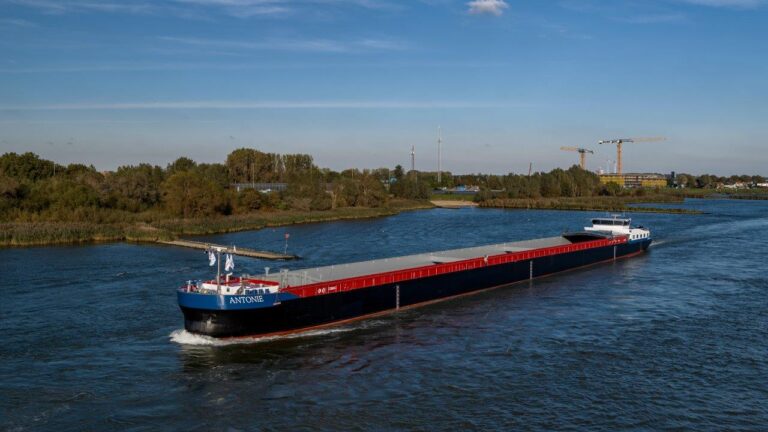Concordia Damen and Lenten Scheepvaart have created a hydrogen-electric cargo ship to support zero-emission transportation on Dutch inland waterways. According to the companies, the Hydrogen Electric Cargo Ship Antonie (WEVA) is the world’s first-ever new-build hydrogen-powered inland shipping barge.
Concordia Damen and Lenten Scheepvaart signed a contract for the construction of the vessel in June 2021. On October 23, 2023, the technical sea trials were held, during which the ship was inspected by Lloyd’s Register and received a provisional certificate to be put into service. With the hydrogen containers not yet installed on board, full attention could be given to testing the advanced diesel-electric propulsion system, the companies say. These containers are expected to arrive by the end of 2023.
Bart van Driel, project manager at Concordia Damen, said, “The fuel cell will soon serve as an energy supplier for the battery packs after the installation of the distribution panel and the placement of the hydrogen containers. The fuel cell itself, which converts hydrogen into electricity, has already been installed on board. Once the distribution panel is delivered, it is just a matter of sizing and manufacturing the final pieces of piping and adjusting the fuel cell installation itself. The diesel generator will then no longer be used, so the Antonie will sail completely emission-free.”
Pieter Baggerman, naval architect at Concordia Damen, added, “We look forward to the Antonie being able to sail her first fully emission-free miles before the end of the year.”
The dry cargo vessel will transport salt for chemical production company Nobian. For years, Lenten Scheepvaart has been shipping salt from Delfzijl to the Nobian plant in Botlek. The company turns this salt into chlor-alkali, among other things, with hydrogen as a residual product. The hydrogen produced in the chlor-alkali production process will soon form the clean fuel for the Antonie.
With three hydrogen containers on board, Antonie will soon have enough energy available for full zero-emission transportation between Delfzijl-Rotterdam and Delfzijl, where a hydrogen bunker station has now been built. This is intended to support the companies’ circular economy targets.
The WEVA project was a joint effort by Concordia Damen Shipbuilding in collaboration with CCM3, Nedstack Fuel Cell Technology, Nobian, Energy TransStore, NRPC and client Lenten Scheepvaart, among others. Its realization has been made possible in part by a grant from the Dutch Ministry of Infrastructure and Water Management.
For more key power and propulsion updates from the electric and hybrid marine technology industry, click here.



